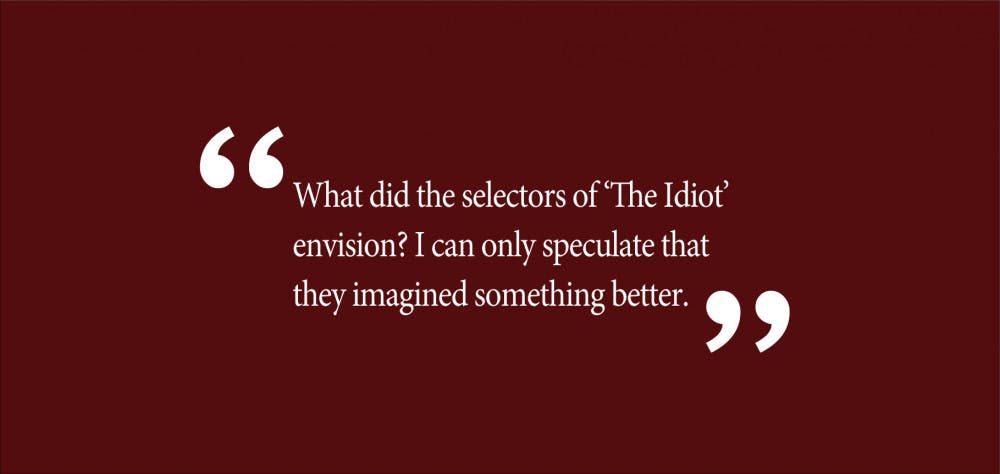This past summer, as anxiety and excitement for the coming year stewed within the hearts of Brown first-years all over the country and all over the world, we received a book in the mail. It was our First Readings, a novel called “The Idiot.”
I still remember eagerly opening that conspicuously book-shaped lump of a package on my doorstep one day in July and excitedly cracking open the pages of the novel. The reading, in some way, felt strangely real and concrete. Over the lazy summer months, the idea of attending Brown had become a sort of abstraction. But that summer day, as I held the book in my hands, effectively given my first homework assignment, the idea of Brown became marginally more real, tangible and imminent.
What did I expect? In my state of summer naivete, I certainly had high hopes for the story, for something to inspire or excite. Little did I know that “The Idiot” would disappoint in more ways than one. Its ultimate value, if any, lay beyond its pages instead of within them. The conversations had in the wake of its failure as a book created a new kind of unexpected connection within the first-year class.
I finished “The Idiot” the same week that I received it in the mail, all four hundred some pages of it. My initial reaction to its ending was supreme confusion. The prose, at times unfocused and other times strangely lucid, was interspersed with esoteric anecdotes, emails and subplots. All of it was beckoning toward some profound resolution. And yet, if you read the last line of “The Idiot”, you are met with the ultimate anticlimax: “I hadn’t learned anything at all.” It was a particularly underwhelming line from an already underwhelming conclusion, devoid of romance, vindication or really anything revelatory.
I have often wondered why the First Readings committee wanted us to read such a book. There is a part of me that can empathize with their motivations. The novel, telling the story of the hopelessly lost college freshman Selin, can be seen as a sort of consolation. Maybe we don’t need to know where we are going — even though I am already well aware of the merits of the Open Curriculum. Maybe we can all learn to laugh at ourselves a little — maybe the book’s title tells us about how Brown upperclassmen view us new first-years. And considering that the narrator Selin is a Harvard student, the last line of the novel may have just been intended as a tongue-in-cheek attack on our Ivy League neighbors.
Indeed, there are varying interpretations about how we can view the story, but none of them fundamentally change how I feel about the book. I did not like it. And through many discussions with other first-years during orientation, I have realized that many others feel the same way. The book, with its unconventional narrator and narrative, was an unenjoyable experience for many students. And though our opinions certainly do not detract from the literary merit of the book, which was a Pulitzer Prize finalist, or from the enjoyment of those who did like the book, numerous questions still linger. Why “The Idiot”?
Beyond the literary interpretations of the novel, I think that the first-year reading represents, more broadly, a Brown student’s first interaction with the university. In some way, it also forms one of our first shared experiences as a class. What did the selectors of “The Idiot” envision? I can only speculate that they imagined something better. “We are confident that ‘The Idiot’ will elicit lively and meaningful discussion,” Dean of the College Rashid Zia wrote in a University statement.
The committee could not have expected the abject indifference felt by many of us as we made their way through the novel. Nor could they have foreseen the numerous faculty members who felt entirely comfortable criticizing the book right along with us during discussion several weeks ago. In such a sense, “The Idiot” was a failure. But despite our general dislike of “The Idiot”, there is something admirable about a book that defies first reading cliché: A book which isn’t overtly optimistic or self-righteous, but which portrays the realities of first-year angst, failure and confusion.
I did not like “The Idiot.” But I am glad that I read it. During the brief span of first-year orientation, when the topic occasionally swung for some reason to the First Readings, we could bond over our mutual dislike of the book, or at the very least, we could debate its meaning. Two weeks into class, there are now far more interesting things to talk about, and the novel has faded into the collective unconscious of the first-year class.
But invariably, I will think about the book just a little. And unlike its narrator, I have learned something along the way — the value of suffering through things together. Whether a strange book, the brown rice at the Ratty or the impending Rhode Island winter, things are better when we all are idiots together.
Johnny Ren '23 can be reached at jiawei_ren@brown.edu. Please send responses to this opinion to letters@browndailyherald.com and op-eds to opinions@browndailyherald.com.





